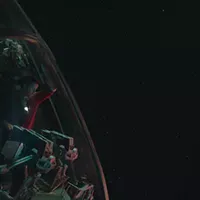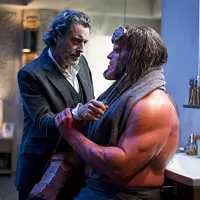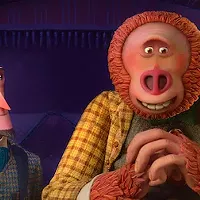

(View From The Couch is a weekly column that reviews what's new on Blu-ray and DVD.)
ARGO (2012). The best picture of an admittedly weak year, director-star Ben Affleck's Argo is an amazingly proficient film in which great swatches of humor never get in the way of the suspenseful saga at its center. Loosely based on a true story, it relates the smaller drama that was playing off stage next to the main attraction of the Iran hostage crisis of 1979, when militants invaded the U.S. embassy in Tehran and captured 52 Americans. While this situation was dominating international news, little was known about the plight of six Americans who managed to slip out of the embassy undetected; as presented in this film, the six find sanctuary in the home of the Canadian ambassador (Victor Garber). Knowing that the group will eventually be found and most likely executed, the U.S. government weighs a number of lousy options — for starters, giving the sextet bicycles and asking them to pedal their way out of the country — before reluctantly settling on the one proposed by CIA specialist Tony Mendez (Affleck): Head to Iran under the pretense of making a movie, and then bring the stranded Americans back under the guise of various crew members. Mendez heads up the operation himself, but in order to be convincing, he first travels to Hollywood to get expert counseling from two boisterous individuals (John Goodman and Alan Arkin) who can help him create his fake film: Argo, a derivative science fiction flick set in an exotic locale. Scripter Chris Terrio, primarily working from a Wired article by Joshuah Bearman, doesn't traffic in mindless jingoism, and he and Affleck also treat the portions involving the stranded embassy workers with the solemnity they deserve, largely leaving the humor for the Hollywood sequences featuring established cutups Arkin and Goodman. Indeed, the only levity to be found in the Tehran-set sequences involves the dopey 'staches found on the American men — then again, that's just Affleck engaged in period verisimilitude. Nominated for seven Academy Awards (with Affleck notoriously overlooked for Best Director), this won three: Best Picture, Adapted Screenplay and Film Editing.
Just in time for the holiday season, Warner Bros. has opted to again release Argo on Blu-ray, this time as an Extended Edition featuring both the theatrical version as well as a cut that runs approximately 10 minutes longer. This handsome set also includes a 64-page photo book, an annotated map of the story's locations, a replica of the film's CIA badge for Affleck-as-Mendez and, most amusingly, a mini-poster of the sci-fi film-within-a-film Argo. New Blu-ray extras include a piece on the CIA's celebration of Mendez' mission impossible; a featurette on Affleck tackling double duty as director and actor; and the quickie "Argo F*ck Yourself." Extras carried over from the previous edition include audio commentary by Affleck and Terrio (theatrical version only); a picture-in-picture option featuring the real-life participants (theatrical version only); interviews with Mendez, former president Jimmy Carter and the six stranded Americans; and a featurette about the authentic period look of the film.
Movie: ***1/2
MYSTERY SCIENCE THEATER 3000: 25TH ANNIVERSARY EDITION (2013). It's been a quarter-century since MST3K began as a locally produced program on Minneapolis' KTMA-TV, and to celebrate, the folks at Shout! Factory have released Volume XXVIII as an anniversary set, complete with tin container. It's one of the series' best box sets to date, and it offers six movies instead of the traditional four.
Moon Zero Two (movie made in 1969; featured on MST3K in 1990) is interesting for a couple of reasons: It was one of Hammer Films' rare attempts at making a science fiction film rather than its traditional horror flicks, and it was widely promoted as a "space Western" (a good 12 years before Sean Connery and co. aped High Noon in Outland). Unfortunately, all interest is confined to the trivia, since the film itself is a mediocre yarn about an astronaut-for-hire (James Olson) helping a woman (Catherine Schell, seven years before returning to the moon as Maya on TV's Space: 1999) find her brother, a miner who might have been the victim of foul play. Regular readers might recall that I'm not generally a fan of Season One episodes, but this one provides more chuckles than most, starting with the Mads' gruesome toothpaste dispensers.
Back in the VCR era, the very first MST3K episode I recorded was The Day the Earth Froze (movie made in 1959; featured on MST3K in 1993) - not because of the film, but because of the preceding short. Here Comes the Circus earns my vote as the series' best quickie, with Joel and his robot friends never pausing for air as they bury the piece with hysterical quips (the clown-spanking bit is pure gold). As for the feature film, a Finnish-Soviet co-production involving a witch's efforts to acquire a magical concoction known as "sampo," it likewise serves as a receptacle for plenty of tasty retorts. Pound for pound, this is one of the collection's best episodes.
The Leech Woman (movie made in 1960; featured on MST3K in 1997) finds the Satellite of Love crew poking fun at a low-budget horror flick in which an unhappily married alcoholic (Coleen Gray) joins her jerk of a husband on an African expedition as he searches for what amounts to be a youth serum. After the potion turns her young again, the wife craves more, and she'll kill anyone to get it. The movie could be worse (as someone on the SOL notes, it's at least better than Congo), but the boys couldn't be better, arming their slingshots with ammo from M, The Beverly Hillbillies and even The Autobiography of Miss Jane Pittman.
There are a handful of episodes in which the targeted movie isn't that bad, and Gorgo (movie made in 1961; featured on MST3K in 1998) is one such example. A Godzilla-style picture in which a giant sea beast destroys London, the film is appreciated by many critics; one is Leonard Maltin, who awards it three stars in his annual film guide. It's a brilliant move, therefore, to have Maltin himself show up in some of the host segments, hawking his book and fielding questions from the Bots regarding Umberto D. and The Fish That Saved Pittsburgh. And even if it's no Manos: The Hands of Fate, Mike, Crow and Tom Servo nevertheless find plenty to mock, and even take time out from film-watching to play Trivial Pursuit: William Sylvester Edition and stage a variation on Samuel Beckett's Waiting for Godot (Waiting for Gorgo, of course).
As an added bonus, the set includes two episodes of historic worth: Mitchell (movie made in 1975; featured on MST3K in 1993), Joel's last episode, and The Brain That Wouldn't Die (movie made in 1962; featured on MST3K in 1993), Mike's first. Brain finds a scientist saving the severed head of his beloved, planning to graft it onto whatever female body he finds most hubba-hubba. It's a terrible movie but a decent episode (great Mark Hamill dig: "Luke, join me or you'll star in Corvette Summer"), as Mike works overtime easing into Joel's role as the hapless human trapped in space. As for Mitchell, what needs to be said? It's one of the series' classic episodes, with Joel and the Bots mercilessly hammering slovenly star Joe Don Baker at every turn (Baker later reportedly threatened to beat up the filmmakers, so they retaliated by showcasing another Baker bomb (Final Justice) in a priceless episode. "Mitchell!"
DVD extras include a three-part retrospective piece looking at 25 years of Mystery Science Theater 3000; the featurette Last Flight of Joel Robinson; introduction to Moon Zero Two by horror film historian Constantine Nasr; MST3K's own making-of piece on Gorgo; an explanation by Maltin; and theatrical trailers.
Collection: ****
NOSFERATU (1922) / CITY LIGHTS (1931). While it would be absolutely accurate to call F.W. Murnau's Nosferatu and Charlie Chaplin's City Lights two of the greatest silent films ever made, it would also be somewhat limiting. What we have here are two of the greatest films, period, tracking all the way from the birth of cinema at the end of the 19th century through the movies currently in 21st century multiplexes.
Forget the countless Dracula films over the decades, even the classic ones starring Bela Lugosi, Christopher Lee and Gary Oldman: Murnau's German feature Nosferatu remains the best vampire movie of all time. It possesses a strain of sheer dread not captured by any subsequent bloodsucker film, with credit for that achievement going equally to Murnau and actor Max Schreck. Murnau's expressionistic approach employs shadows to amazing effect, and he delights in playing with the technical tools of the trade (special effects, film speeds, etc.) in ways that enhance the eerie atmosphere. As for Schreck (which means "terror" in German), his Count Orlok is a frightening, rat-faced creature, possessing nary an ounce of the charisma, suavity or even animal magnetism that later actors would bring to the role. Nosferatu is clearly based on Bram Stoker's Dracula, and since it was an unauthorized adaptation, Stoker's widow turned to the courts and successfully had all known prints destroyed. Thankfully for film fans - and for film history - the movie has survived. Nosferatu was skillfully remade by Werner Herzog as 1979's stylish Nosferatu the Vampyre, starring Klaus Kinski; for a fun triple bill, watch both these versions chased by 2000's Shadow of the Vampire, starring John Malkovich as Murnau and Willem Dafoe (in an Oscar-nominated turn) as Schreck, who turns out to be a real vampire!
City Lights was made several years after talkies had been introduced, but such was the power and popularity of Chaplin that he was able to risk releasing a silent movie in the sound era - and then sit back as the rave reviews and strong box office poured in. Considered in many circles to be Chaplin's best movie - the American Film Institute's 100 Films list places it much higher than either The Gold Rush or (my pick) Modern Times, and even Chaplin named it his favorite among his own works - this finds him once again playing the beloved character of the Little Tramp, here falling in love with a blind flower girl (Virginia Cherrill) and befriended by a millionaire (Harry Myers) who's only friendly when he's drop-dead drunk. No filmmaker has ever been as successful as Chaplin in tugging at our heartstrings while simultaneously leaving us helpless in laughter, and City Lights finds him operating at the peak of his abilities, even throwing his usual social critique into the mix. The film is one superb vignette after another - the unveiling of the statue, the millionaire's attempted suicide, the mix-up between the hunk of cheese and the bar of soap, the shenanigans at the restaurant, and that amazingly orchestrated boxing match - and it all leads toward a final few minutes of incredible power, truly one of cinema's great fadeouts.
The two-disc Blu-ray edition for Nosferatu offers the film with both English intertitles and German intertitles. Extras include the 2007 making-of documentary The Language of Shadows; excerpts from eight other Murnau films, including 1925's Tartuffe, 1926's Faust and 1931's Tabu; and a photo gallery. Extras on City Lights include audio commentary by Chaplin biographer Jeffrey Vance; a short 2003 documentary on the film; archival behind-the-scenes footage taken during production; and international trailers.
Nosferatu: ****
City Lights: ****
THE WOLVERINE (2013). The less charitable among us would say that Hugh Jackman has his meal ticket and won't let go of it for anything. After all, The Wolverine marks the sixth time the actor has played the surly superhero (yes, six; don't forget his hilarious, split-second cameo in X-Men: First Class), a streak that's even more pronounced in a genre in which most actors tap out after just one or two appearances. But Jackman hardly needs this character to sustain his Hollywood career - he did, after all, pick up an Oscar nomination this year for Les Miserables -- so clearly he feels an affinity for the part and wants to do right by it. Unfortunately, these solo outings, away from the rest of the X-Men, just aren't quite cutting it. Like X-Men Origins: Wolverine, this latest effort is a middling superhero saga that attempts to deepen our understanding of the character but instead ends up mainly treading narrative water. Using 1982's four-issue limited series Wolverine as its starting point, the film finds Wolverine (aka Logan) journeying to Japan at the request of an enemy combatant whose life he had saved during the bombing of Nagasaki at the close of World War II. That individual, Yashida (played during the WWII scenes by Ken Yamamura and as an elderly man by Hal Yamanouchi), is close to death, and he wants to thank Logan for his help all those years ago. But it soon turns out that Yashida has more on his mind than a simple gesture of gratitude, and Logan soon becomes immersed in turbulent family affairs involving Yashida's son Shingen (Hiroyuki Sanada) and Shingen's daughter Mariko (Tao Okamoto). Serving as a sidekick to Logan is Yukio (Rila Fukushima), a pint-size warrior woman (she looks like an anime character come to life) who proves to be a valuable ally. Superhero movies are often defined as much by their villains as by their good guys, and it's in this area where The Wolverine proves to be especially deficient, as the slinky Viper (Svetlana Khodchenkova), the Silver Samurai and various Yakuza minions make for a boring bunch. But the disappointment doesn't stop with the evildoers, as the late Jean Grey (Famke Janssen), formerly a vibrant X-character, pops us in Logan's dreams to offer him life lectures - these sequences are sluggish and trite, and it was pointless to include her character at all. Indeed, huge chunks of the film feel draggy and underdeveloped, and yet the moments that work feel fresh and invigorating, as director James Mangold , A-list writer Scott Frank (Get Shorty) and C-list writer Mark Bomback (the Total Recall remake) break free from the template of the big-screen superhero saga to fashion something more personal. This solemnity often feels at odds with the filmmakers' need to satisfy the blockbuster quota (an extended battle atop a speeding bullet train is a doozy), but it nevertheless makes for an occasionally sharp film that can cut through Man of Steel and perhaps even Iron Man 3 like an adamantium claw through hot butter.
Blu-ray extras include several making-of featurettes examining the character of Wolverine, Jackman's approach to the role, the Ronin elements of the story, and more; an alternate ending; and a tour of the set of the upcoming X-Men: Days of Future Past.
Movie: **1/2


